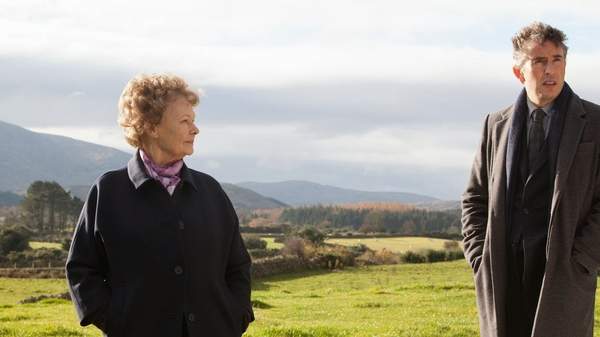Overview
It's worrying the way we deride films aimed at an older audiences as simply being a Best Exotic Marigold Hotel facsimile designed to snare seniors, given how we largely ignore the fact that the majority of mainstream cinema over the past 30 years has been made for 12-year-old boys.
Philomena, with its poster depicting a smiling Judi Dench alongside a stoic Steve Coogan, will no doubt be dismissively lumped in with this crowd. It is, however, a million miles away from the likes of Best Exotic (which, for the record, was actually rather good).
Based on a true story, Philomena follows ex-political spin doctor Martin Sixsmith (Coogan), who, in an attempt to revive his journalism career, chases the "human interest story" of Philomena (Dench) an elderly woman searching for her long-lost son. In flashbacks, we see the younger Philomena (Sophie Kennedy Clark) as she becomes pregnant out of wedlock, and is forcibly kept in servitude by nuns, who then sell her son to a wealthy couple. As the pair investigates, the truth behind the forced adoption becomes all the more shocking.
Coogan, who not only portrays Sixsmith but also co-wrote the screenplay, strikes a perfect tone with such sensitive material. The revelations are powerful and honest without being gut-wrenching; the comedy is welcome and consistent without being inappropriate. It's a remarkable juggling act, directed beautifully by Stephen Frears, who atones for recent disasters Lay the Favorite and Tamara Drewe.
Coogan's sardonic Northern charm makes Sixsmith a compelling lead, and his relationship with Dench's Philomena is wonderfully developed. It's Dench who is the real standout here. At this point in her career, she could easily get away with sleepwalking through roles, relying on her undeniable presence to carry her performances. But as in 2006's Notes on a Scandal, she creates a character unrecognisable from her previous roles. Philomena is pleasant, vague, forceful and compellingly well-rounded. Dench's energy and attention to detail elevates this film to something even more remarkable.
The depiction of the Catholic structure both past and present is one of the most fascinating elements of Philomena. It's caused controversy, with many accusing the film of being anti-Catholic. To make such an accusation, however, fundamentally misses the point, and excuses the crimes committed in the name of the church.
The film does not shy away from Philomena's piety or Sixsmith's atheism, and argues strongly in favour of both. Sixsmith is deeply compassionate without religion, whilst Philomena embodies the ideals of Christianity that the Church and its representatives so often and so demonstrably forget.
Disinterested in a sanitised "I'm okay, you're okay" message, the film manages to extol the best elements of both atheism and Christianity whilst unrelentingly and unapologetically shining a light on the darker side of organised religion. It is truly impressive stuff.
Be not fooled by the marketing materials, which make the film look like an aged-up version of The Trip with Judi Dench in place of Rob Brydon. (Although, thinking about it, that would be brilliant.) Philomena is a terrifically made, entertaining work that stands head and shoulders above many of the films being forced upon us this Christmas. See it.
